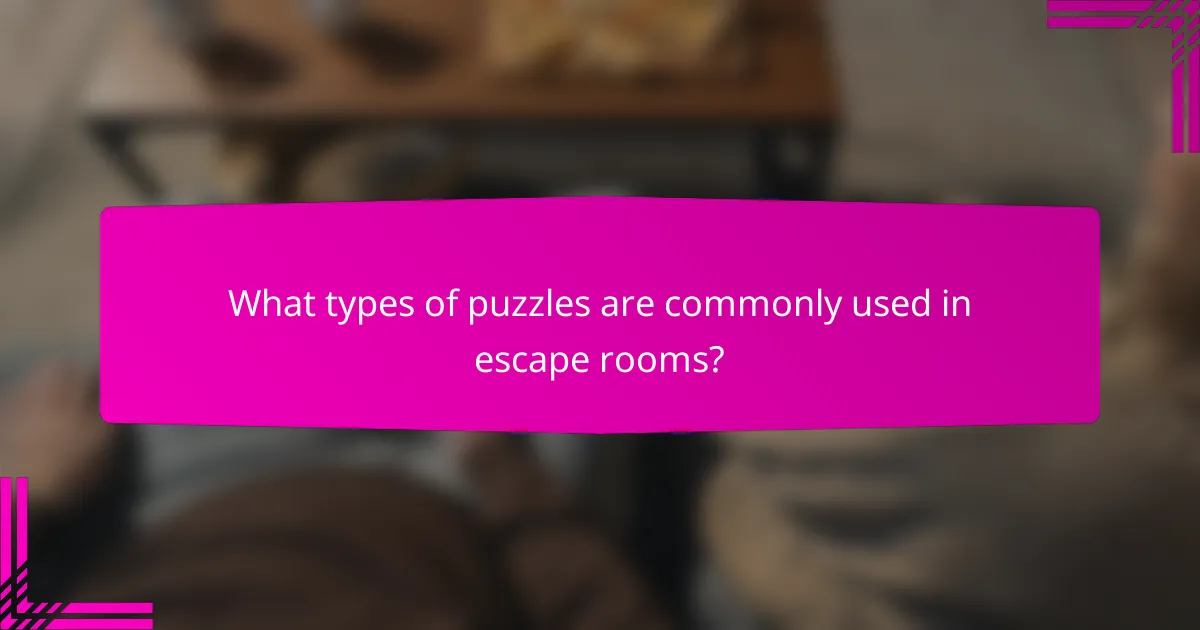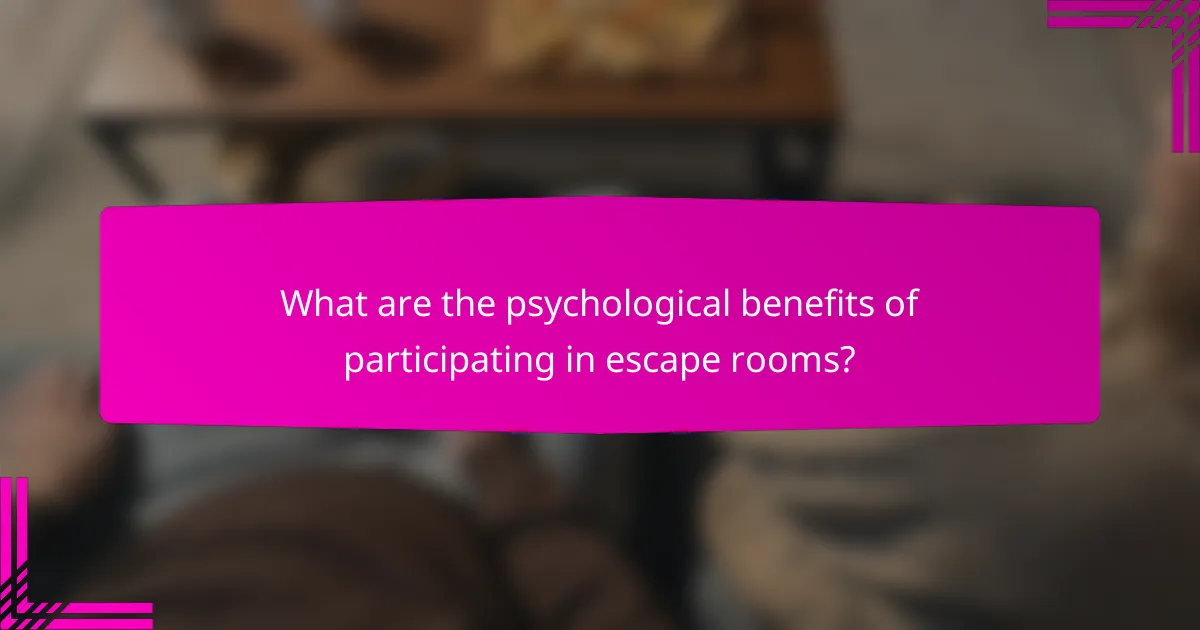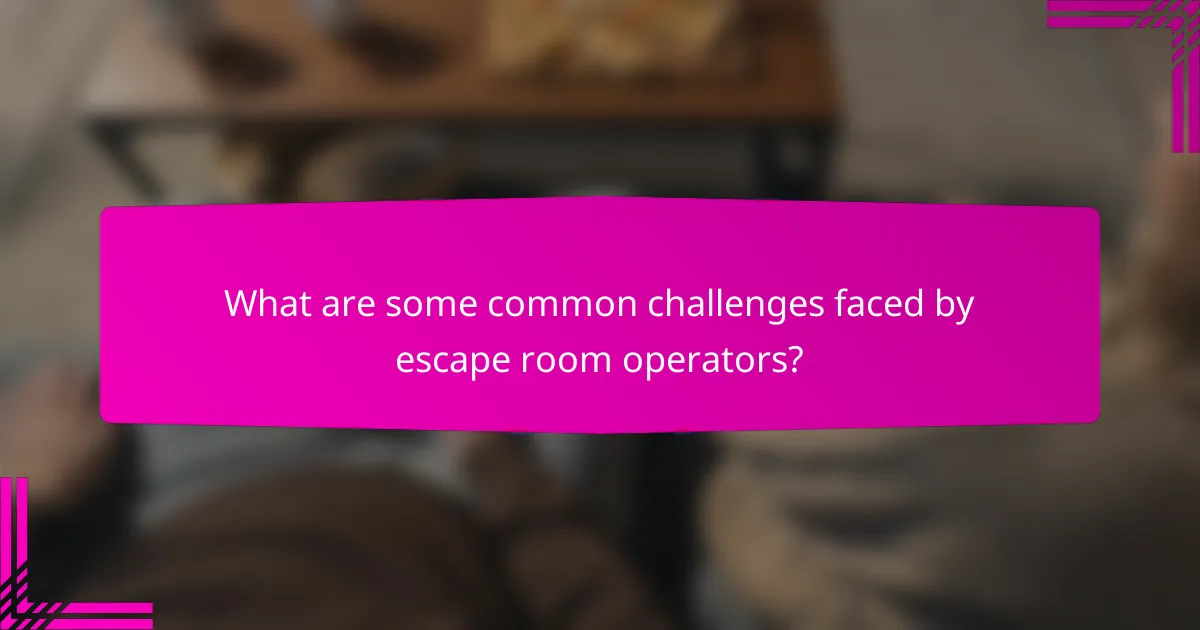Escape room games provide an engaging way to enhance teamwork and problem-solving skills. This article explores popular themes like mystery and adventure, diverse puzzle types including logic and physical challenges, and the impact of group dynamics on success. Unique features and common challenges faced by operators will also be discussed, along with strategies for maximizing the escape room experience.

What are the key themes in escape room games?
Escape room games feature key themes that enhance the immersive experience. Popular themes include mystery, horror, adventure, and fantasy, each offering unique narratives and challenges. Puzzle types vary widely, incorporating logic, riddles, and physical tasks, fostering teamwork and communication. Group dynamics significantly influence success, as collaboration and diverse skill sets are essential for solving puzzles effectively.
How do themes influence player experience?
Themes significantly shape player experience in escape room games by creating immersive narratives and emotional engagement. A well-crafted theme enhances puzzle integration, making challenges feel relevant and stimulating. For example, a horror theme can evoke fear and urgency, while a mystery theme may encourage collaboration and critical thinking. This alignment between theme and puzzles fosters memorable group dynamics, as players become more invested in the storyline and their roles within it. Ultimately, the theme serves as a foundation that influences player interaction, motivation, and satisfaction throughout the game.
Which themes are most popular in North America?
Escape room games in North America commonly feature themes such as mystery, horror, adventure, and fantasy. Popular puzzle types include logic puzzles, physical challenges, and team-based tasks. Group dynamics often emphasize collaboration and communication skills, enhancing the overall experience.
What thematic variations exist across different cultures?
Thematic variations in escape room games reflect cultural values and storytelling traditions. Different cultures incorporate unique historical elements, folklore, and local myths into their themes. For example, Asian escape rooms may feature ancient legends, while European rooms often highlight historical events. Puzzle types also vary, with some cultures favouring logic-based challenges and others emphasizing teamwork or physical tasks. Group dynamics can shift based on cultural norms regarding collaboration and competition, influencing how players interact during the game.

What types of puzzles are commonly used in escape rooms?
Escape rooms commonly use various types of puzzles, including logic puzzles, physical challenges, word puzzles, and observation tasks. These puzzles engage players and require teamwork to solve.
Logic puzzles often involve codes or riddles that demand critical thinking. Physical challenges may require players to manipulate objects or navigate spaces. Word puzzles typically involve deciphering clues or completing phrases. Observation tasks focus on noticing details within the room to unlock further clues.
These diverse puzzle types enhance the immersive experience and foster group dynamics, making escape rooms popular for team-building activities.
How do puzzle types affect team dynamics?
Puzzle types significantly influence team dynamics in escape room games by shaping communication, collaboration, and problem-solving strategies. Diverse puzzles encourage different skill sets, fostering teamwork and enhancing group cohesion. For example, logic-based puzzles may enhance analytical thinking, while physical challenges can promote active participation.
Additionally, the variety of puzzle types can create roles within teams, such as leader, strategist, or communicator, which can lead to more defined group dynamics. Teams that engage with a mix of puzzles often exhibit improved adaptability and resilience, as they learn to navigate various challenges together.
Ultimately, the interplay between puzzle types and team dynamics can enhance the overall experience, making escape room games a powerful tool for team building and social interaction.
Which puzzles promote critical thinking and collaboration?
Escape room games effectively promote critical thinking and collaboration through immersive themes and diverse puzzle types. These games require participants to solve intricate challenges, fostering teamwork and communication.
Common themes include mystery, adventure, and horror, each presenting unique puzzles such as logic riddles, physical challenges, and pattern recognition tasks. These elements encourage players to engage in strategic discussions, share ideas, and combine skills, enhancing group dynamics.
Research indicates that escape rooms can improve problem-solving abilities by 30% among participants. The collaborative nature of these games also helps build trust and rapport within teams, making them valuable for both recreational and educational purposes.
What are some innovative puzzle designs seen in 2025?
Innovative puzzle designs in 2025 feature immersive themes, interactive technology, and collaborative problem-solving. These designs enhance engagement and challenge participants in unique ways.
1. Augmented reality puzzles that blend digital elements with physical environments.
2. Multi-sensory experiences incorporating sound, smell, and touch to deepen immersion.
3. Narrative-driven puzzles that evolve based on player choices, creating dynamic storylines.
4. Escape rooms designed for diverse group dynamics, accommodating various team sizes and skills.
5. Eco-themed puzzles promoting sustainability and awareness through gameplay.
6. AI-driven puzzles that adapt difficulty levels in real-time based on player performance.

How do group dynamics impact escape room success?
Group dynamics significantly influence escape room success by affecting communication, teamwork, and problem-solving. Effective collaboration enhances puzzle-solving efficiency, while diverse group roles can lead to innovative solutions. Trust among participants fosters a supportive environment, increasing overall enjoyment and engagement. Research indicates that groups with clear leadership and defined roles perform better, completing challenges more quickly and effectively.
What roles do individuals typically take within a team?
Individuals in a team typically take on roles such as leader, communicator, problem-solver, and implementer. Each role contributes uniquely to the group’s success in escape room games. Leaders guide the team, communicators ensure clarity, problem-solvers tackle puzzles creatively, and implementers execute strategies effectively. Understanding these dynamics enhances group performance and enjoyment.
How can team composition influence problem-solving effectiveness?
Team composition significantly influences problem-solving effectiveness in escape room games. Diverse skills and perspectives enhance creativity and collaboration. A balanced mix of analytical thinkers, communicators, and hands-on problem solvers fosters a dynamic environment. Additionally, group dynamics, such as trust and communication, directly affect the team’s ability to tackle challenges. Effective teams leverage individual strengths, leading to quicker and more innovative solutions.
What strategies can teams use to enhance communication?
Teams can enhance communication in escape room games by implementing clear roles, encouraging open dialogue, and utilizing non-verbal cues. Establishing defined roles ensures that each member knows their responsibilities, promoting accountability. Open dialogue fosters an environment where ideas and strategies can be freely shared, enhancing problem-solving. Non-verbal cues, such as gestures and eye contact, can effectively convey information quickly, especially in time-sensitive situations. These strategies improve group dynamics and lead to a more cohesive team effort in solving puzzles.

What are the psychological benefits of participating in escape rooms?
Participating in escape rooms enhances psychological well-being by promoting teamwork, problem-solving, and stress relief. These activities foster social connections and improve communication skills. Engaging in challenging puzzles boosts cognitive function and enhances mood through the sense of accomplishment. Additionally, the immersive environment encourages creativity and critical thinking, contributing to overall mental health benefits.
How do escape rooms foster teamwork and collaboration?
Escape rooms foster teamwork and collaboration by requiring players to solve puzzles collectively. Participants must communicate effectively and share ideas to progress. This interaction enhances problem-solving skills and builds trust among team members. Additionally, the immersive environment encourages a sense of shared purpose, motivating players to work together towards a common goal.
What role does stress play in the escape room experience?
Stress enhances the escape room experience by increasing engagement and teamwork among participants. The pressure to solve puzzles within a time limit fosters collaboration and communication. As players navigate challenges, adrenaline boosts focus and creativity, leading to a more immersive experience. This dynamic can strengthen group dynamics, making the game memorable.

Which unique features set certain escape rooms apart?
Unique features that set certain escape rooms apart include immersive storytelling, innovative puzzle design, and customizable experiences. These elements enhance player engagement and create memorable adventures.
Immersive storytelling often integrates thematic elements that captivate participants. Innovative puzzle design utilizes technology and unique mechanics, offering varied challenges. Customizable experiences allow groups to tailor difficulty and themes, enhancing inclusivity for diverse audiences.
What technological advancements are shaping escape room design?
Technological advancements like augmented reality, virtual reality, and automation are significantly shaping escape room design. These innovations enhance immersion, create dynamic puzzles, and streamline operations. Augmented reality overlays digital elements onto the physical environment, enriching the storytelling aspect. Virtual reality offers fully immersive experiences that transport players to different worlds. Automation improves efficiency in puzzle mechanics and player engagement, allowing for more complex and interactive challenges.
How do immersive experiences enhance player engagement?
Immersive experiences in escape room games significantly enhance player engagement by creating a captivating environment. These experiences leverage themes and puzzle types to encourage teamwork and problem-solving. Players feel a sense of urgency and excitement, which drives their involvement. Additionally, unique narrative elements and interactive challenges deepen emotional connections, making the gameplay memorable.

What are some common challenges faced by escape room operators?
Escape room operators face several common challenges. These include maintaining engaging themes, managing diverse group dynamics, and ensuring puzzle difficulty is balanced. Operators must also navigate competition and adapt to changing customer preferences. Additionally, staffing and training personnel to deliver high-quality experiences can be challenging.
How do operators ensure a balanced level of difficulty?
Operators ensure a balanced level of difficulty by assessing player skills and designing puzzles accordingly. They analyze player feedback and adjust challenges to maintain engagement. The variety of puzzle types, such as logic, physical tasks, and team-based challenges, caters to diverse abilities. This adaptability enhances the overall experience and encourages teamwork.
What are the best practices for maintaining escape room themes?
To maintain escape room themes effectively, focus on consistency, immersion, and regular updates. Ensure all elements, from decor to puzzles, align with the chosen theme. Create engaging narratives that enhance player experience. Regularly refresh puzzles to keep the experience challenging and exciting.
What common mistakes should operators avoid?
Operators should avoid common mistakes that can hinder the escape room experience. Failing to test puzzles thoroughly can lead to frustration among players. Overcomplicating puzzles may confuse participants, while underestimating the time needed for completion can disrupt flow. Neglecting to provide clear instructions can result in misunderstandings. Additionally, not considering group dynamics might create an unbalanced experience for players. Lastly, overlooking maintenance of props and equipment can detract from immersion.

How can players maximize their escape room experience?
To maximize their escape room experience, players should focus on teamwork, communication, and strategy. Engaging actively with teammates enhances problem-solving and enjoyment.
1. Choose the right team: Select diverse skills for balanced contributions.
2. Communicate clearly: Share ideas and observations promptly.
3. Stay organized: Keep track of clues and puzzles.
4. Manage time effectively: Prioritize tasks to ensure completion.
5. Embrace creativity: Think outside the box for unique solutions.
6. Have fun: Enjoy the experience regardless of the outcome.
These strategies enhance engagement and increase the likelihood of success.
What strategies can enhance puzzle-solving efficiency?
To enhance puzzle-solving efficiency in escape room games, focus on teamwork, communication, and strategy. Encouraging diverse thinking styles within the group can lead to innovative solutions. Establishing clear roles based on individual strengths enhances productivity. Regular practice with various puzzle types builds familiarity and improves speed. Setting time limits for each puzzle fosters urgency and focus, promoting quicker decision-making.
How should teams prepare for an escape room challenge?
Teams should prepare for an escape room challenge by strategizing, communicating effectively, and practicing problem-solving skills. Start by discussing individual strengths and preferences. Establish roles based on those strengths, such as puzzle solvers or clue gatherers. Familiarize the team with common puzzle types found in escape rooms, like logic puzzles or physical challenges. Time management is crucial; set time limits for each puzzle to maintain momentum. Finally, build a positive team dynamic to enhance collaboration and creativity during the challenge.
What tips do experts recommend for first-time players?
Experts recommend starting with clear communication, understanding the theme, and dividing tasks among group members. Focus on teamwork and problem-solving to enhance the experience. Familiarize yourself with common puzzle types, such as logic puzzles and physical challenges. Stay calm and think creatively when facing obstacles.
